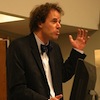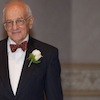Historian's Take: The Second Presidential Debate
 Daniel Pipes (www.DanielPipes.org) is president of the Middle East Forum. © 2012 by Daniel Pipes. All rights reserved
Daniel Pipes (www.DanielPipes.org) is president of the Middle East Forum. © 2012 by Daniel Pipes. All rights reserved
This evening’s presidential debate, the second between Barack Obama and Mitt Romney, featured some very sharp disagreements over facts that almost no viewers can judge (such as the licenses issued for drilling in federal lands) and agreement on the topics where viewers have strong opinions (such as capitalism). Perhaps this debate will move those few undecided voters in Ohio, Virginia, and Florida, but it leaves the rest of us judging the debate according to which candidate we’d rather have as a dinner companion. Put differently, Romney missed an opportunity by not discussing larger issues but letting himself get mired in details.
Obama got away with saying that he had characterized the attack on the Benghazi consulate as a terrorist incident because the moderator confirmed his point; in fact he misrepresented the facts when he said “The day after the attack, governor, I stood in the Rose Garden and I told the American people and the world that … this was an act of terror.” Reince Priebus, the Republican Party chairman, instantly seized on this inaccuracy and accused Obama of lying and others are sure to follow suit. This inaccuracy will likely haunt Obama over the next three weeks and turn the Libyan fiasco into an even bigger problem for his re-election campaign. That will matter more than who “won” the debate.
* * * * *
 K.C. Johnson is professor of history at Brooklyn College, CUNY. He is the author of numerous books and articles on U.S. foreign relations and politics, including "All the Way with LBJ: The 1964 Presidential Campaign" and "Congress and the Cold War."
K.C. Johnson is professor of history at Brooklyn College, CUNY. He is the author of numerous books and articles on U.S. foreign relations and politics, including "All the Way with LBJ: The 1964 Presidential Campaign" and "Congress and the Cold War."
The last presidential debate recalled 1992 in featuring a disastrous performance by the incumbent president, a performance that (fairly or unfairly) seemed to reinforce the opposition’s charges that he was out of ideas on how to improve economic conditions. Tonight’s recalled 1992 in a different way, since that year originated the odd “town hall” debate format in which representatives of the nation’s tiny portion of undecided voters get to replace the media in asking questions of the presidential candidates.
This format, in general, tends to produce off-beat questions (such as the question that hurt the first President Bush, in which a woman bizarrely asked how the deficit personally affected him). But this year’s structure allowed for marginally greater participation by the moderator, and produced what struck me as the most interesting moment of the debate.
It came in a discussion about the president’s policy toward Libya. The events following the killing of Ambassador Christopher Stevens provide a wide opening for criticism of the administration’s aura of competence in international affairs. It’s hard to reconcile the combined inability to adequately assess the threat to the consulate compound, UN Ambassador Susan Rice’s post-killing confusing statements on the Sunday talk shows, and the failure to secure the consulate grounds after the attack with the image President Obama has tried to present to the country (and the world) of someone who rarely makes mistakes in foreign policy.
Yet Governor Romney has not only struggled to make this basic line of attack, but has found ways to almost make Libya a negative for him by focusing on tangential matters far afield from the policy questions at hand. First, of course, Romney erroneously labeled a pre-demonstration statement by the U.S. embassy in Egypt as the initial administration response to the attack in Libya. Then, he generated a request from the family of one of the Americans killed in the attack to stop talking about their son on the campaign trail. And last night, in the debate, he not only bypassed substance to attack Obama on semantics -- claiming that in the Rose Garden the day after the attack, Obama hadn’t called the killings an “act of terror” -- but got his facts wrong.
And the viewers found out, when moderator Candy Crowley (somewhat sheepishly) jumped in to say that yes, in fact, the President had referred to the killings as an “act of terror.”
The exchange reinforces an impression of Romney as the foreign policy opposite of Theodore Roosevelt -- a figure who seems to think that in foreign affairs, the president should speak loudly, while focusing more on talk than anything else. Perhaps this emphasis on tone is necessary because, with the important exception of his recommended approach toward Israel, the substance of Romney’s international proposals, to the extent it’s possible to discern them, diverge far less from Obama’s foreign policy than the rhetoric would suggest.
Given the general public indifference toward foreign policy this year, the Libya exchange will probably have little, if any, impact on the race. But there was little from this debate to reverse the general impression created in the campaign that a Romney presidency will be too simplistic and overly inclined to bluster in foreign affairs.
* * * * *
 Ira Chernus is Professor of Religious Studies at the University of Colorado at Boulder. He is the author of numerous books, including Monsters to Destroy: The Neoconservative War on Terror and Sin; Apocalypse Management: Eisenhower and the Discourse of National Insecurity; American Nonviolence: The History of an Idea; Dr. Strangegod: On the Symbolic Meaning of Nuclear Weapons.
Ira Chernus is Professor of Religious Studies at the University of Colorado at Boulder. He is the author of numerous books, including Monsters to Destroy: The Neoconservative War on Terror and Sin; Apocalypse Management: Eisenhower and the Discourse of National Insecurity; American Nonviolence: The History of an Idea; Dr. Strangegod: On the Symbolic Meaning of Nuclear Weapons.
Did you think the second presidential debate was too nasty, that it was sad to see the two lead actors portray such a polarized image of American politics? The third performer up on the stage, moderator Candy Crowley, didn’t think so.
“They were talking to their bases who want to see them stand up to each other,” Crowley said on CNN after the debate. “They were so good being at each other’s face, and I thought this was a debate, so I let it go. … It was so good.”
The woman with the only front row seat didn’t seem to be interested in the content of the candidates’ arguments, much less their logical coherence. She cared about the show. And as long as they were at each other’s face, “it was so good.”
Crowley and the thousands of other journalists and commentators all read from the same prescribed text: It’s fundamentally about performance. And appropriately so, since the debate is above all television entertainment.
Obama lost the first debate because of his poor performance. In fact he lost most because of his performance when he wasn’t speaking. So the content of his words could not have played much role at all in his loss.
That’s why everyone was focused on Obama’s performance in the second debate. And he played it pitch perfect. When Romney spoke, Obama showed no scorn or disinterest or boredom. He was all ears, apparently paying attention with the appropriately neutral face. But when it was his turn to speak, he was at Romney’s face -- certainly not all the time, but enough to make it the biggest news event of the night.
Romney gave more or less as good as he got, though -- letting the New York Times website headline (happily, I trust), “Rivals Bring Bare Fists to Rematch.”
Most voters will agree it was a good debate. It offered enough conflict to create a good drama, which is always entertaining.
But the voters have a much more urgent question than “Was it a good show?” As Maureen Dowd put it, “Every election has the same narrative: Can the strong father protect the house from invaders?” That’s the question the voters ask about each candidate -- consciously or unconsciously -- as they watch the two perform.
That’s bound to be the crucial question in a nation whose political life is shaped so much by the myth of homeland insecurity -- a myth that says invaders are always outside, threatening to burst through the door and destroy us if our leaders don’t have fists strong enough to keep them out.
There’s no common agreement about who the invaders are. Indeed, one way to understand American political discourse is to see it as a debate about the name of the truly threatening invader. Is it the rich who thrive in an unregulated, runaway, overly free market? Or is it the government, imposing too much taxation and too much regulation? Or perhaps the terrorists? Or maybe it doesn’t matter so much who, exactly, the invaders are.
The crucial question is which candidate is strong enough to keep out the invaders, whoever they may be.
Oh, perhaps you thought the crucial question had something to do with the economy, since you’ve been told that about a zillion times. Consider this:
In CNN’s instant (but “scientific”) poll of second debate watchers, well over 55 percent said Romney would be the better president when it comes to boosting the economy and lowering the debate. But the same group awarded Obama a victory in the debate by the sizeable margin of 46 percent to 39 percent.
Obama lost the first debate, the media consensus agrees, because he simply did not look strong enough to protect the house. In the second debate, he was warned, he had either to look strong enough or to expect defeat on Election Day. He certainly got the message, proved himself up to the task, and took home the blue ribbon.
But Romney did a creditable job of performing the role of strong father, too. So he’s not out of the race by any means. It will continue to be close unless one or the other candidate shows a moment of major weakness.
(I’ll be posting a somewhat longer version of this column on MythicAmerica.us.)
* * * * *
 Leo P. Ribuffo teaches history at George Washington University and is writing a book on the Carter presidency.
Leo P. Ribuffo teaches history at George Washington University and is writing a book on the Carter presidency.
Like most human events that occur regularly over several decades, presidential debates have become ritualized. But even long-standing rituals allow for variations. Weddings, for example, can be ritzy events at country clubs or folk mass ceremonies in clover fields. Since the Kennedy-Nixon debates of 1960 the major changes have been the increasingly intrusive role of the news media before, after, and most importantly during the debates; the greater physical mobility of the candidates to the point where they can walk around and come close to confronting each other physically; and in at least one debate per season inclusion of what used to be called "the people" but is now designated (with comparable imprecision) as "the middle class."
The "middle class" questioners have become as stylized in their way as Dorothea Lange's soulful Depression-era photographs that defined what poor people were supposed to look like. Here, too, there is some variation. The questioners chosen to participate in the debate represent a variety of racial and ethnic groups; their attire signals different levels within the "middle class," a category that is now generally construed to include at least 90 percent of the population. Their questions shun policy wonkery -- why else include unspoiled representatives of the people, er, middle class? -- in favor of earnest inquiries about how the candidates' policies would affect them personally, usually in the short run. Tonight, for example, one questioner asked about lowering gasoline prices soon and another, a twenty-year-old student, worried about finding a job when he graduated in two years.
I have often wondered about how the questioners and questions are chosen (see above re: the increasingly intrusive role of the news media). Why, for example, did the controversy over the deadly attack on the American consulate in Benghazi make the cut? Did nobody show up with broad conceptual questions and/or a sad understanding that most of the issues central to major party politics involve cushioning the present pain of high unemployment and the future pain of the country's latest structural economic transition?
So I fantasized about making the cut for audience participation. My hypothetical questions involve no great conceptual complexity though some may sound as archaic in 2012 as folk mass weddings in clover fields. Here are a few inquiries from me the people:
Intermittently I stopped thinking like me the people and enjoyed what Pat Buchanan accurately called a "good fight." And, despite Romney's continuing attempt at born again moderation, viewers from all social classes could probably figure out that Obama is more liberal on economic issues and much more liberal on women's equality and abortion.
* * * * *
 Bernard A. Weisberger is a distinguished teacher and author of American history. He has taught at several American universities, including the University of Chicago and the University of Rochester, where he served as chair of the history department.
Bernard A. Weisberger is a distinguished teacher and author of American history. He has taught at several American universities, including the University of Chicago and the University of Rochester, where he served as chair of the history department.
If Bill Clinton had not already appropriated the title of "the comeback kid," Obama could have worn it this evening at the end of ninety minutes of high-intensity cut and thrust during which it appeared to me that the President scored almost all the damaging hits. His energetic performance was so different from that of the first debate that I almost suspected the Obama of two weeks ago of having overdosed the previous night on Ambien.
The debate format this time brought to the fore the questions that were uppermost in the minds of a small group of yet undecided voters selected by the debate's organizers, though the questions they would ask from what on the screen resembled a jury box were kept secret from the candidates and their coaches. Jobs, especially for recent college graduates, came up first, followed by gasoline prices (over which all voters seem to believe a president has mysterious control,) and then what taxes the public might expect from either man if he won. The jobs issue gave Obama an opening to defend the steps he had already taken -- the stimulus, the rescue of the auto industry, and the Jobs Act stalled in the Republican-controlled House --with a vigor that had long been lacking. Romney responded with what became an oft-repeated refrain throughout the evening -- the economy was in dreadful shape and the jobless were suffering, but his economic plan would re-start the engines of growth and bring the unemployment numbers down impressively. He promised 12 million jobs in four years, one of many numbers that were tossed into the air by both debaters that had to wait for post-show verification from fact-checkers in the broadcast studios .
The gasoline price issue led to a ringing clash over what actions to take, with both men committed to continued American production of more coal, natural gas and oil so as to make us energy-independent and free to ignore price-rigging by OPEC and similar cartels. Romney, strong in the faith of "drill here, drill now, pay less" (and the pipeline for Canadian tar sands oil) accused Obama of creating shortages by clamping down on permits for exploration and development of gas and oil sources on public lands. Obama's answer was more or less "triangulated." Many permits and leases had been issued but were withdrawn when it appeared that no immediate development was going on, Meanwhile, it was necessary to proceed in "environmentally sound" ways and pour more investment into renewable and non-polluting means of energy production. And yet the question of why private investors should be allowed to make money at all out of natural resources and lands belonging to the public at large remained untouched. For this historian it brought back echoes of the Great Barbecue of the post-Civil War years when ranchers, miners and lumber companies helped themselves to the treasures of the West virtually free of charge.
When it came to the question of taxes Romney repeated once more his assurances that he could cut taxes, increase military spending, and still manage to find economies that would cut the deficit. These strategies, aptly described by the first President Bush when he was fighting Reagan for the nomination as "voodoo economics," were appropriately shredded by Obama.
Obama scored again and again on rhetorical exchanges on immigration, women's rights, and wherever and whenever he could hang the albatross of the Tea Party's absolutist opposition to any form of tax increases and to any relaxation of Victorian moral standards around Romney's neck. On trade, on the loss of jobs to foreign nations, Obama seized the occasion to remind the audience of Bain's assistance in the export of manufacturing jobs. What this achieved was to drive an increasingly irritated Romney back again and again to claiming that every problem could be solved by the robust economy which he, as an experienced businessman, would create. At times the two men were shouting at each other almost face-to-face, coming close to calling each other liars without actually doing so. For the performance-watchers there was enough red meat to fill every butcher shop in Hempstead, if not all of Long Island.
Yet Obama always steered clear of any genuinely radical commitment. On gun control he swore his allegiance to the Second Amendment but did urge a renewal of the ban on assault weapons and more stringent measures to keep guns out of the hands of mentally incompetent people. Then he quickly broadened his argument out to call for an end to the culture of violence through the kinds of social programs of help to troubled youths that cause right wing opponents to denounce him as a socialist between their clenched teeth. And to rebut that, he ran the gamut of free-enterprise articles of faith: he believed, he said, in individual initiative, self reliance, hard work, the free enterprise system -- but with a level playing field and the same set of rules for all. That was part of his summing up, which he followed finally by taking advantage of Romney's disastrous overheard dismissal of the 47 percent of "takers" and idlers dependent on government handouts. One by one he ticked off the members of that group -- all hardworking (but not necessarily unionized), conscientious, responsible individuals dedicated to family and country. All that was needed was a choir of "God Bless America" swelling up from underneath.
Obama never forsook his "centrism," his essential avoidance of boat-rocking, his malleability and his still active, but dormant during this election campaign, desire for bipartisan harmony. He is not the antithesis of Republicanism that progressives want, knowing that our democracy is up against powerful plutocratic enemies, buttressed by the power of money to control our hideously expensive elections.
But he was not wrong in saying that he had a fundamentally different vision of the nation than Romney. For what most struck me, as it must other historians, was Romney' unswerving dedication to propositions straight out of the Roaring Twenties. "The business of America is business." Government cannot create jobs (news to millions of civil servants from sanitation workers in government buildings to PhDs in astrophysics in Washington's scientific government bureaus.) I half expected him to quote the words of a nineteenth-century entrepreneur nettled by criticism of his tactics, that it was hard to be criticized by reform-minded politicians, "men who have never done anything but pose and draw a salary."
During the debate when Obama complained of the outsourcing of U.S. jobs abroad Romney answered that the reason was the administration's hostility to business. What he, as president, would do would be to create a climate here that invited investment. I thought about that for a big and realized its implications. Truly, if America offered a non-organized labor force beaten into accepting low wages for more work, virtual immunity from taxation and regulation, and indifference to the wreckage of the environment, it might discourage movement of capital abroad. Instead of fleeing to where they could produce their profits in foreign sweatshops, they would bring the sweatshops back here. Economic royalism is alive and well.
* * * * *
 Ruth Rosen, a former columnist for the Los Angeles Times and San Francisco Chronicle, is a Professor Emerita of History at U.C. Davis and a scholar in residence at the Center for the Study of Right-Wing Movement at U.C. Berkeley. Her most recent book was “The World Split Open: How the Modern Women’s Movement Changed America.”
Ruth Rosen, a former columnist for the Los Angeles Times and San Francisco Chronicle, is a Professor Emerita of History at U.C. Davis and a scholar in residence at the Center for the Study of Right-Wing Movement at U.C. Berkeley. Her most recent book was “The World Split Open: How the Modern Women’s Movement Changed America.”
A town hall format is a tricky format for a presidential debate. It’s supposed to be the one truly democratic debate. The moderator chooses questions from undecided voters selected by the Gallup Organization. Candidates, of course, have their agenda ready and use any opportunity to return, again and again, to their own talking points.
Each candidate is judged by his ability to connect with people, by poking holes in his candidate’s logic and by his ability to move gracefully across the town hall space while trying to convince the audience there and at home that he genuinely cares about their lives and has credible plans to improve them.
The substance of what they said was often less important than the image each candidate projected. How he spoke, how he looked, how he walked, truly mattered. The large television audience could detect which candidate felt comfortable in his own skin and had to decide who they found personable, charming and yet, down to earth. At stake tonight was whether the audience thought that President Barack Obama cared more about ordinary Americans than Mitt Romney, known for his extraordinary wealth and promotion of tax cuts for the wealthy.
So how did they do? This time, President Obama came off forceful, but in a presidential and effective manner. This time he did not allow Romney to spout his litany of lies. In fact, he frequently invaded Romney's space to say that his opponent's statement was not true. His face, attentive and animated, sometimes grew angry when Romney repeated the same lies he had deployed in the first presidential debate. This may sound odd, but even though Mitt Romney is a conventionally handsome man, he looked pasty and pale next to President Barack Obama. If Richard Nixon looked too dark with his five o’clock beard, Mitt Romeny looked too white next to Obama’s honey-colored skin.
If I had been in the audience, I would have asked them questions that are not often asked and almost always evaded. I would have asked how they intend to resolve the Israeli/Palestinian conflict. I would have asked them what they would do to stop the foreclosure of one more family’s home. I would have asked how they would close the gaping wealth inequity that is destroying America’s middle class. I would have asked them why they can’t return to the taxes of the 1950s, when the wealthy paid 90 percent and more of their income and investments. I would have asked them why we keep about 800 military bases open, while we close libraries, schools, and watch our universities, infrastructure, and health care decline. I would have asked them whether they believe the American people are “entitled” to food, shelter and education. (Romney has said they are not.) I would have asked them to explain why citizens pay taxes. And, finally, I would have asked them to name ten issues, aside from abortion, that directly affect the lives of women.
So what did the audience actually ask? Turns out that the questions were mostly predictable -- “how will I get a job after college?” -- and the answers fit the two candidate’s political philosophies. Mitt Romney wants everyone to do it on his own; Barack Obama reminded the audience how his grandfather’s G.I program after WWII put him through college.
The real surprise was about women. This was the question I would have asked, and amazingly, it came up. A young woman asked what each candidate would do about the pay inequity that gives women 72 cents for every dollar men earn. For the first time, Obama explained why discrimination against women issues are everyone’s issues. He reminded the audience that he had signed legislation that gave women workers equal pay; he also pointed out that he had funded Planned Parenthood, as opposed to Romney who had said he would stop funding it. Obama told the audience that women’s issues also included his Obamacare health program, Social Security, Medicare, and fairer loans to students. Taking on Romney’s anti-immigration policies, Obama reminded the audience that he had supported the Dream Act, which would allow students of illegal parents to remain in the United States. Romney, by contrast had opposed the Dream Act.
Obama’s success rested on his willingness to list considerable accomplishments he has achieved during his administration. He withdrew the United States from two wars, passed a stimulus bill that prevented another Great Depression, he saved the automobile and financial industries, sought -- but failed -- to raise the taxes on the wealthiest Americas; eliminated Osama bin Laden; jump-started new technologies for clean energy; forced the auto industry to create fuel efficient cars; and reminded people that women are more than the sum of their reproductive organs.
In short, President Obama not only won this debate; he came across as a powerful president who is genuinely with expanding the middle class by creating jobs built on new technology and energy for the twenty-first century, as opposed to Romney, who promotes using fossil fuels and cutting the taxes of the wealthy.
The differences couldn’t be greater. This time Obama seemed presidential, a man in change, a leader with a vision of a society in which wealth inequity is closed, the middle class once again prospers, and everyone can once again imagine a future for families.
* * * * *
 Gil Troy is Professor of History at McGill University, and the author, most recently, of The Reagan Revolution: A Very Short Introduction, (OUP) and Why Moderates Make the Best Presidents: George Washington to Barack Obama . His other books include: Hillary Rodham Clinton: Polarizing First Lady and Morning in America: How Ronald Reagan Invented the 1980s. He is a member of the advisory board of HNN. His website is giltroy.com. His next book “Moynihan’s Moment: America’s Fight against Zionism as Racism” will be published this fall by Oxford University Press.
Gil Troy is Professor of History at McGill University, and the author, most recently, of The Reagan Revolution: A Very Short Introduction, (OUP) and Why Moderates Make the Best Presidents: George Washington to Barack Obama . His other books include: Hillary Rodham Clinton: Polarizing First Lady and Morning in America: How Ronald Reagan Invented the 1980s. He is a member of the advisory board of HNN. His website is giltroy.com. His next book “Moynihan’s Moment: America’s Fight against Zionism as Racism” will be published this fall by Oxford University Press.
The editorial section of Real Clear Politics gives the ultimate verdict on the second debate. It shows the pro-Obama New York Times declaring Mr. Obama Comes Back. It shows the pro-Romney New York Post concluding Romney Wins on Points. And it has the middle of the road USA Today proclaiming Second Debate a Split Decision. In short, Barack Obama did not have a second debate debacle and Mitt Romney continued appearing solid, presidential, and far more moderate than the caricatures of him suggest.
The polls echo these findings, although they tend to be giving Obama a slight edge. Obama’s bigger win was in the campaign narrative wars. Predictably, proving Woody Allen’s insight that “Eighty percent of success is showing up,” when Obama showed up, loaded for bear, he launched hundreds of Obama is back campaign stories. This was a classic pseudo-event, a media-generated moment that fit into the narrative many reporters were looking to right, to keep the campaign alive.
In truth, stylistically, both candidates were more similar than different. They were well-prepared and well-spoken, assertive without being too aggressive, with neither giving much ground. The moment relatively early in the debate when they each looked like they were about to butt heads or chests over gas drilling, was great theatre – but not a game changer.
Substantively, serious issue differences persisted, with important clashes over Libya, taxes, immigration, and energy. Whereas some debates tend to diminish one or both candidates, this debate boosted both. Obama left feeling vindicated that his first-time stumble was a fluke. Romney continued feeling vindicated that the stereotype of him as a fanatic or a fumbler was fading. And the American people should feel vindicated that amid all the hoopla and distractions, this set of debates is proving entertaining and edifying, introducing the candidates and their positions to tens of millions of voters, building excitement and engagement toward Election Day.
